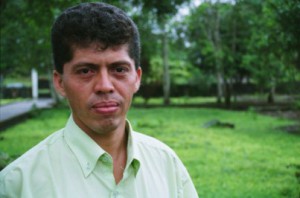Case against Chevron: Is it really about money?

Some big news out of Ecuador this week: A judge in Nueva Loja (also known as Lago Agrio, or “bitter lake”) issued a guilty verdict against Chevron and is fining the company $8.6 billion for polluting this fragile northeastern region of the country for more than 20 years. Media reports say this is the biggest judgment ever against any company for an environmental case.
Those of us following the case are glad to see that justice can be achieved by the people of the Amazon against one of the most powerful companies in the world – but it’s also clear from the history of this case that Chevron will do whatever it takes to avoid paying a single penny to the people who have suffered for decades. The struggle is not over.
Oxfam helped our partner Amazon Defense Front (FDA) organize the legal case against Texaco (later acquired by Chevron, along with the responsibility for the environmental disaster) back in 1994. There were 100 communities representing about 30,000 people, roughly 30 percent of them indigenous communities, united in an unusual “Assembly of Delegates” designed to ensure the legal case and its strategy is aligned with the priorities for the communities.
When the case was thrown out of the courts in the US, the Assembly decided to keep pursuing the case in the courts in Ecuador. The people have remained remarkably unified for many years. The delegates did not want to settle the case out of court, they wanted a judgment.
In 2004 I visited the area affected by this oil pollution, including a place called San Carlos, where a 1999 study by the University of London reported people there are as several times more likely to get certain unusual types of cancer. Here and in many other areas there were ponds full of oil waste and toxic water polluting rivers and wells. Nearly everyone I spoke with was ill or knew someone who was suffering. It seemed horrible and hopeless, but the people were committed to getting justice.
One man told me he supported the case against the oil company and knew the FDA would win. “You can’t block out the sun with just one finger,” he said. “There’s just too much evidence.”
Not a single individual involved in the case told me that they personally wanted money. They all said they wanted help to provide a healthy water supply, and get clinics and hospitals to help sick people. Even now, the FDA is saying it will appeal the judgment because the fine is insufficient. It is setting up a fund to ensure the money will be managed in a transparent manner and will be used to clean up the environment and address the staggering public health issues. No matter what happens with this case, their struggle is far from over.

Pablo Fajardo, the FDA’s lead attorney on this case and winner of the prestigious Goldman Environmental Prize, once told me that the case was really about justice, and basic rights: “Those of us who live here have a great opportunity to demonstrate to the rest of the country that we are men and women with rights equal to those of others.”